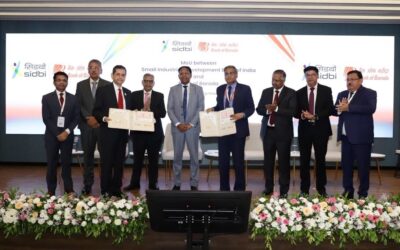Tech-Driven Transformation: How Indian MSMEs Can Leverage Modern Technology for Sustainable Growth

The adoption of technology among Indian MSMEs has been uneven. While some forward-thinking enterprises have embraced digital transformation, many others lag due to various barriers such as cost, lack of awareness, and technical expertise. The MSME sector contributes approximately 30% to India’s GDP and 45% to its exports, underscoring its critical role in the economy. Despite this, different surveys have found that only about 50-60% of MSMEs have adopted digital technologies, indicating significant room for improvement.
Embracing modern technology is essential not only for staying competitive but also for ensuring sustainable growth. This article explores how Indian MSMEs can harness modern technology to drive sustainable growth, highlighting key areas of technological integration, government initiatives, and practical solutions to common challenges.
Fintech Solutions: Simplifying access to credit
One of the most transformative impacts of technology on MSMEs has been in the financial sector. Fintech innovations are revolutionizing how small businesses access credit and manage their finances. Traditional banking processes can be cumbersome and exclusionary for MSMEs due to stringent requirements and lengthy approval times.
In contrast, fintech companies leverage advanced algorithms and data analytics to assess creditworthiness more efficiently and provide quicker loan disbursements. The Indian fintech market size is estimated at USD 111.14 billion in 2024 and is expected to reach USD 421.48 billion by 2029, growing at a CAGR of 30.55% during the forecast period. Of this, a significant portion is driven by SME financing. The adoption of fintech solutions not only provides easier access to credit but also helps businesses manage their cash flow better and make more informed financial decisions.
Digital Marketing: Enhancing reach and customer engagement
Digital marketing is another area where technology can significantly impact MSMEs. Traditional marketing methods often prove to be cost-prohibitive and less effective for small businesses with limited budgets. In contrast, digital marketing offers a more affordable and measurable approach.
MSMEs can leverage social media platforms, search engine optimization (SEO), and email marketing to reach a broader audience and engage customers more effectively. Tools like Google Analytics and social media insights allow businesses to track customer behaviour, optimize marketing strategies, and achieve higher returns on investment. By harnessing the power of digital marketing, MSMEs can not only enhance their brand visibility but also build stronger relationships with their customers.
E-commerce Platforms: Expanding market access
The rise of e-commerce has opened new avenues for MSMEs to expand their market reach beyond local boundaries. A survey by CRISIL in November 2020 indicated that digital sales platform adoption among Indian MSMEs increased dramatically post-pandemic from about 29% pre-pandemic. Platforms like Amazon, Flipkart, and local e-commerce websites provide small businesses with access to a larger customer base without the need for significant investment in physical infrastructure.
Additionally, setting up an online store has become more accessible with the availability of user-friendly platforms like Shopify, WooCommerce, and BigCommerce. These platforms offer comprehensive solutions, including inventory management, payment gateways, and customer support, enabling MSMEs to streamline their operations and focus on growth.
Cloud Computing: Enhancing operational efficiency
Cloud computing offers a scalable and cost-effective solution for MSMEs to manage their operations. By migrating to the cloud, businesses can access a range of services, including data storage, software as a service (SaaS), and infrastructure as a service (IaaS). This reduces the need for significant upfront investments in hardware and software.
Cloud solutions enable MSMEs to scale their operations according to demand, improve collaboration through real-time data access, and enhance data security. Providers like Amazon Web Services (AWS), Microsoft Azure, and Google Cloud offer tailored solutions for small businesses, making it easier for MSMEs to adopt and benefit from cloud technologies.
Government Initiatives: Supporting digital transformation
The Indian government has implemented several initiatives to support the digital transformation of MSMEs:
- Digital India: A campaign to ensure the government’s services are made available to citizens electronically by improving online infrastructure and increasing Internet connectivity.
- Make in India: Aims to transform India into a global design and manufacturing hub.
- Credit Linked Capital Subsidy Scheme (CLCSS): Provides financial support for the adoption of modern technology in manufacturing processes.
- GeM (Government e-Marketplace): An online platform created by the Government of India to facilitate the procurement of goods and services by various government departments and organizations. GeM provides MSMEs with access to government contracts, ensuring transparency and efficiency in procurement processes. GeM offers a vast catalogue, featuring nearly 312 service categories and more than 11,800 product categories, ensuring it meets the diverse needs of government buyers. The platform has achieved a cumulative Gross Merchandise Value (GMV) exceeding Rs 5.93 lakh crore, supported by over 1.8 crore transactions since its inception
- JAM Trinity (Jan Dhan Yojana, Aadhaar, and Mobile): Facilitates digital transactions and financial inclusivity (Growth Navigate) (EY USA).
- India Stack: A set of APIs that enable businesses to perform digital transactions and secure authentication.
To overcome cost barriers, MSMEs can explore affordable solutions such as open-source software and cloud services. Lack of awareness and technical expertise can be addressed through training programs and collaborations with industry associations. Leveraging government schemes that provide training and consultancy services can also help bridge the knowledge gap.











